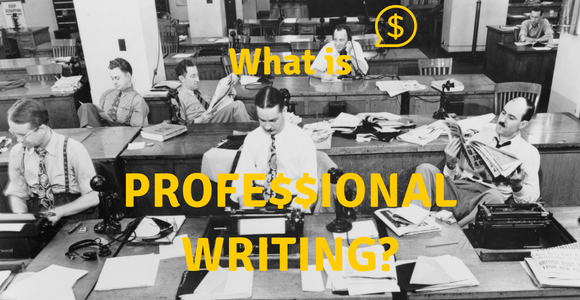According to Wikipedia, professional writing covers the following: all writing in exchange for reward; any written form of communication produced in a workplace environment; writing as a profession.
This should settle the whole professional writing dilemma in less than 30 words but not for me.
Being in the professional writing industry for years, I’ve seen a lot of “professional written content” and I want to scream out loud:
“THIS IS NOT PROFESSIONAL WRITING!”
Most of the so-called, professional writing agencies specialize in cookie-cutter writing solutions. Quantity over quality. As for the cheap freelancers out there, they can’t even use the quantity over quality excuse. They just lack what should be professional writing skills
Professionals are not professional anymore
I bet this applies to other industries as well. However, let’s stay on writing for now. I guess you already got my point – you can barely find a professional writing service out there. Even if you pay good money for it.
“Don’t believe everything you see on the Internet!”
Mr. Isaac Newton once said these great words, and he was absolutely right. See what I did there? Just because I put a bunch of words together, use quotations, a picture every now and then, doesn’t make me a legit writer. Especially not if I put a “professional writing specialist” in my name.
People love titles and positions and the Internet is giving people the opportunity to get creative with whatever titles they can think of. We all have that Facebook friend who works in Facebook (but not actually), we all have that friend that just got a new DSLR camera and is now a professional photographer on Instagram, we all have that friend who just discovered WordPress or Wix and is now a professional blogger, and the list goes on…
Just because people say they are professionals in something, it doesn’t mean they actually are. Just because I started working for a professional writing company, it doesn’t automatically make me a professional writer. It’s my writing that makes me a professional.
And this is what the anonymous “professional writer” on Wikipedia got wrong.
Just because your work has been used for a commercial purpose, doesn’t mean you are professional in it. Yes, it means this is your profession, but when it comes to writing, it doesn’t need to be professional writing.
Professional writing ≠ professional writing
Are you confused?
I myself am a bit confused now. What I’m trying to say is that professional writing is another homograph and people rarely think about it. But I do. I want to talk about it, I want to write about it, and whether or not this classifies as professional writing, I just want to spread awareness!
Wait, does this mean the Wikipedia writer was not actually wrong?
Yes.
Yes, you can use the word professional about writing when you only mean writing for a commercial purpose. What really bugs me is that people tend to use the word professional when they mean quality, creative, excellent, great, virtuous, etc. Especially when it comes to professional writing. Writers who earn money or try to earn money, writing, are using the term wrong.
The illusory truth effect and professional writing
Believe in something until it becomes true
The illusory truth effect is the tendency to believe given information to be correct after repeated exposure. When writers believe in themselves they are professionals when the Internet gives them the opportunity to advertise themselves as professionals, the potential clients barely have the choice, don’t they?
Just think about it. Let’s say you want an article about your business. When you are looking for professional writing specialists, you are not just looking to give your money to somebody, you are more likely expecting quality content, that is representing your business properly, one that is not too cheesy, yet, it’s creative and attention-grabbing. In other words, you are looking for professionally written content.
How to recognize an actual, professionally written content?
Always ask for samples. The catch with big agencies (the ones with the cookie-cutter solutions) is, they’ll show you only their best works. Well, that kind of makes sense right? Everybody has ups and downs and even the most professional writing company can disappoint sometimes. My advise? Just go through all the samples you can find, pick the ones you love the most, and tell your writer/agency that you are looking something like this.
Also, if you get a content that is not satisfying enough, instead of being angry and start calling names (believe me this happens a lot) just ask politely for edits and point out what you need to be changed.
Freelancers, on the other hand, will also show you only their best samples, but instead of a big corporate company that probably has a neverending income, they will do everything possible to meet your expectations and provide content that is closed to perfection (or at least to the samples given). The minus here is that you’re stuck with only one person that may not be experienced enough to represent you and your specific business industry properly.
In other words, you can never be too sure about professional writing but asking for
samples will give you an idea of what you’re getting.
How to advertise for professional writing?
Maybe use the word “professional” more often? Just kidding…
A professional writer shouldn’t avoid using the word professional but use it wisely. Instead of bragging on how “professional” you are, try giving actual information about yourself, prove that you have the required skills, don’t promote yourself too aggressively…Just be a professional. A real one.
I believe that was a lot of information about professional writing and here’s my sum up, just to make things easier to process.
- According to Wikipedia, professional writing is writing for reward as a profession
- According to me, writing in exchange for something is not enough to be classified as professional.
- People looking for professional writing are searching for quality content, not hiring someone who gets paid in exchange for content writing.
These are my thoughts on professional writing. I’ll be glad to see if anybody else shares the same opinion as me. The comment section is open to anybody and I’ll be happy to see other points of view even. See you next time with my next article!






